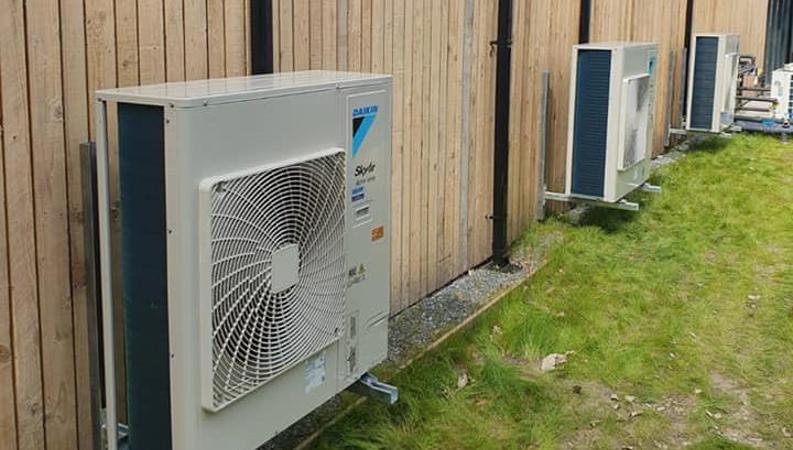Air conditioners are considered essential in most commercial premises, producing an ideal environment for both customers and employees. Ambient temperature has become something that is expected as a standard in most commercial surroundings.
Benefits of Commercial Air Conditioners
Installing a commercial air conditioner offers your business a whole host of benefits. The most obvious benefit being the ability to cool your workspace to the desired temperature, however, there are a number of benefits associated with a commercial air conditioner install that might not spring to mind, including increased employee productivity, increased customer satisfaction and the ability to heat your workspace.
Employee productivity
A business can expect to benefit from enhanced employee productivity as a direct result of an air conditioning installation. An effectively cooled workspace allows for a relaxed environment, where employees are able to focus on workload without being distracted by the discomfort caused as a result of overheating.
Customer satisfaction
A temperature-controlled environment has become something customers have grown to expect as standard when visiting a commercial property. Presenting a comfortable environment encourages customers to spend an increased amount of time within your business, and consequently, it is expected they will spend an increased amount of money.
Heating or cooling
You might be surprised to discover that the majority of commercial air conditioners have the ability to offer both heating and cooling options. Utilising an air conditioning unit as a means of heating your commercial premises can prove more effective than a conventional space heater as it allows the operator complete control. Additionally, an air conditioner boasts increased energy efficiency in comparison to a conventional heater as it harnesses heat from external air, rather than generating heat similar to that of a conventional heater.
The ability to use an air conditioner as a means of cooling or heating is a particularly valuable asset in an office environment. Research has shown that women tend to prefer a warmer workspace, whereas men, in comparison, prefer to work in a cooler environment, air conditioning systems can run on both heating and cooling modes simultaneously in order to cater to this.
Types of commercial air conditioners
Workplaces can prove highly diverse in nature, as such an air conditioner that might be considered suitable for an office environment will likely not be considered suitable for a small café.
Sub-Zero can source a wide variety of commercial air conditioners, tailored to your business’ requirements and budget.
Split commercial air conditioners
A single split air conditioner is regarded as the most popular choice of unit largely due to its affordability and adaptability. A split air conditioning system allows for the heating or cooling of individual rooms, making them ideal for small workplaces such as offices, independent stores and cafes. Multiple split systems can also be installed and used in conjunction with one another to adequately cool, or heat, larger workspaces.
A single split air conditioner benefits from cost efficiency and self-containment, therefore if one unit suffers a fault, the other units will remain intact.
However, for every air conditioning unit installed internally, there exists an external unit. This could present a severe disadvantage if your commercial premises’ does not possess a lot of outdoor space.
Multi-split commercial air conditioners
A multi-split air conditioner operates much the same as a single split air conditioner, the only difference being that up to nine internal units only require one external unit, depending on the model.
One obvious benefit associated with this form of unit is that your commercial premises maintains it's external aesthetic, removing the need for multiple, unattractive external units. However, these systems are generally more expensive and complex to install in comparison to the single split units.
VRV/VRF commercial air conditioners
VRF is an abbreviation of ‘variable refrigerant flow,’ whilst VRV is an abbreviation for ‘variable refrigerant volume.’ This might cause some confusion, but both terms refer to the same type of commercial HVAC system.
If your workspace is medium to large in size, such as that of a large retailer, a VRF/VRV commercial air conditioner will likely be the most appropriate solution for you.
Benefits associated with this particular air conditioning system include the ability to both heat and cool a larger space. This form of unit is also considered highly reliable and efficient, utilising a heat recovery method to recover waste heat from throughout the premises, using this to heat other rooms. In addition to this, the installation of a VRV/VRF system is generally quick and relatively painless, causing little disruption to your workforce.
There are a few drawbacks associated with this air conditioning unit, the most prominent of which being the large purchase and installation costs. When investing in a VRV/VRF system you should also consider investing in a backup condenser, this provides peace of mind in the unfortunate event that the outside unit fails.
Why choose Sub-Zero
Sub-Zero's team of highly experienced and skilled engineers are competent in all things air conditioning and refrigeration, from the initial installation, through to regular servicing and even troublesome repairs.
Our team boasts a wide breadth of knowledge, which is why we offer a completely bespoke design service. Should you feel a little overwhelmed and confused by the number of commercial air conditioners available one of our friendly engineers will conduct a site survey and suggest the most appropriate solution for your requirements and budget.




